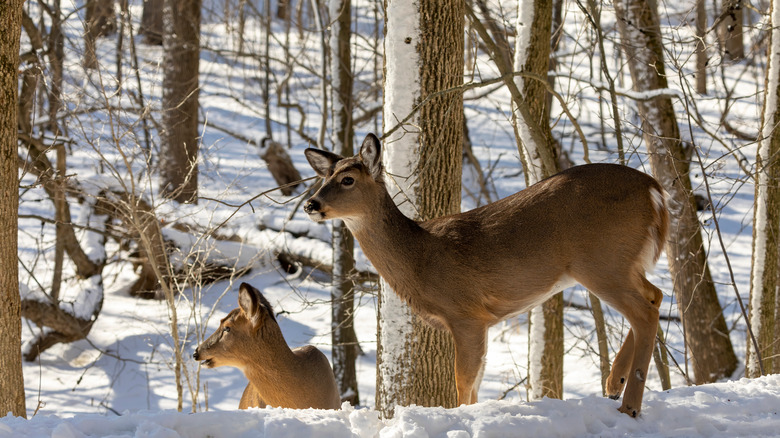What Most People Get Wrong About Using Deer Repellent In The Winter
If you live in close proximity to a wooded area that's not fenced in, you probably see deer visit your lawn almost all year round. Mammals known for their herbivorous dietary habits, deer will eat from countless plants, and they'll likely nibble on even more types during the winter when food is scarce. This makes them a common adversary for gardeners attempting to grow a variety of flowers and produce. While many resort to installing physical barriers, some opt to spray their crops with a chemical repellent instead that features sulfurous odors or bitter tastes. However, it's important to know that deer repellents (much like other chemical pest repellents) are usually less effective when administered in the cold, as the frigid air limits the capacity for the scent to travel and ward off deer. Additionally, weather conditions like wind, rain, and snow could also dampen the effects of the scented products.
Traditional repellents drive deer away naturally by either using scents or tastes they hate or by triggering the animals' senses by signaling that predators are nearby. However, these chemical repellents tend to wear away quite quickly no matter the time of year but especially in the winter. To invest in a repellent capable of keeping deer out of your yard all winter long, opt for a stronger formula that's designed to withstand the cold even when outside temperatures fall below the freezing point. It's also crucial to apply these repellents frequently and during the right weather conditions.
Cold temperatures reduce strength
It may come as a surprise when the deer repellent you regularly use in the summer months generates less-than-promising effects during the winter. This is mostly caused by the temperature's effect on the speed at which the repellent's scent molecules travel around your yard. Colder weather prevents the odor from traveling as far and fast as it would in a warmer climate, making it harder for deer to identify and become averse to the product. Additionally, food is more scarce for deer in the winter. This means that a starving deer is more likely to nibble on plants they may have passed up during warmer months when food was plentiful, even if it doesn't taste ideal. Finally, if applied on a windy, wet, or snowy day, the repellent may not actually stick to the plant, making it ineffective.
Therefore, homeowners will need to rely on a stronger formula and apply it at the right time. Area repellents, or sprays that keep deer away using scent, may be considered completely ineffective in frigid weather. Instead, contact repellents, or those that repel through taste, may generate more success. Be mindful that most repellents don't have a particularly-long life to begin with, as many formulas will last anywhere from two weeks to a month before needing to be applied again. Consistent appliactions are typically necessary, and you should apply them on dry, still days when temperatures are above freezing and when there's no chance of precipitation.
Where to find a 'winter-proof' deer repellent
Manufacturers develop deer repellent formulas that are strong enough to resist 'winter burn', but such products may be difficult to locate for purchase. In order to ensure they fall into responsible hands, makers and carriers of these chemical repellents refrain from selling them directly to the general public, instead catering to professionals with enough experience to administer the products safely and correctly. These formulas are usually contact repellents, meaning they keep deer away by offering an unpleasant taste. They're also often designed with durability in mind, with one formula from DeerPro Professional (specifically the winter variety, available on Nott Products for about $200 or more) calling for only one application toward the middle or end of autumn that should last the entire season.
If you're interested in treating your yard with a winter deer repellent, contact a landscaping professional in your area to weigh your options or schedule a consultation. Additionally, other brands like Liquid Fence and Angry Deer are more user-friendly and cheaper than DeerPro, though they'll need to be applied more often. These can be found at retailers like Lowe's, Home Depot, and Ace Hardware. If you find that chemical repellents aren't an appealing option for your home, there are a variety of physical alternatives like fences and row covers that you can try. These are typically just as effective (if not more so) than their granular or liquid counterparts.


